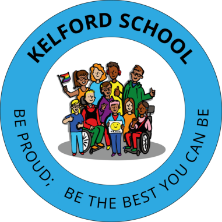EYFS Curriculum
EYFS at Kelford School
Kelford School is a special academy with planned places for 136 pupils. As a school for children and young people with SEND there is a relatively small number on role in the EYFS cohort. When compared to mainstream schools within our local community, Kelford School’s Early Years cohort is unique due to complexity and size.
The Early Learning Goals (ELG) are developmental aims for children at the end of Foundation Stage 2. At Kelford, it is recognised that children develop at very different rates and thus, may not fully meet each ELG by the end of their EYFS journey. Therefore, continued focus on the ELGs into Key Stage One and beyond is highly important.
It is the intention of the school to ensure that all faculties embed the EYFS principles within their curriculum so that the Foundation Stage element underpins what we do and what children learn. The characteristics of effective learning namely; playing and exploring, active learning and creating and thinking critically will be integral to ongoing observations, assessments and planning for next steps.
Our Kelford EYFS curriculum is designed with the needs and interests of all learners at the core. Each theme is chosen to promote relevant learning experiences and an understanding of the world directly around them, whilst simultaneously offering captivating and engaging hooks for learning based on individual interests. All EYFS thematic units of work will underpin Kelford School’s spiral curriculum.
We want all our EYFS learners to experience quality and consistency in their Early Years journey based on a secure foundation of learning. Their Individual Learning Plan (ILP) targets will underpin an enriching and relevant curriculum whilst improving long term outcomes as outlined in their EHCP. Their curriculum entitlement and personalised outcomes will interconnect within each curriculum theme to maintaining value and relevance for every individual.
Our curriculum intends to promote the wellbeing and safety of our pupils whilst providing equality in learning opportunities at a developmentally appropriate stage for each individual. We aim to ensure that all young people in EYFS at Kelford School are prepared for the next stage of their journey. All our young people will feel safe and secure in environments that enable them to develop their Communication & language, Personal Social and Emotional Development & Physical skills before focusing their skills on the Specific areas of learning.
EYFS Assessment
In the Early Years Foundation Stage, assessment of attainment and progress is primarily based on observation, discussion, questioning and evidence of independent learning alongside adult-led activities.
Observations are undertaken by all practitioners who work with the child. Children also have access to areas of continuous provision that enhance and further the learning opportunities available for them. Observations are recorded in a variety of forms; photographic, video and annotations which are uploaded onto the child’s Evidence for Learning account. The observation may be part of a shared experience with a learner or group, have you observed while engaging with me/us?
Analysis of these observations are completed by the teacher and will explore the characteristics of effective learning. They may be responsive, ‘in the moment’ shared experiences, what do you think is happening as you listen and engage with me/us?
Planning for next steps involves deciding how best to support, extend and teach learners. Consideration is given to their interests, the environment and the development of specific skills. Again, this may be part of a responsive and reactive process, how will you support, extend and deepen play interactions and learning in partnership with me/us?
EYFS and SEND
EYFS and SEND are intrinsically linked. The principles involved in ensuring quality provision for those with SEND are similar to the principles that underpin EYFS. It is necessary for all staff involved in delivery to be knowledgeable about, and aware of potential difficulties a child may be facing. This means early years practitioners are able to respond early to concerns and work with other professionals as required.
Supporting children with SEND in early years is essential. Early identification, followed by providing effective provision, improves a child’s long-term outcomes. Effective provision includes high-quality teaching and making reasonable adjustments in order to remove barriers to learning.
